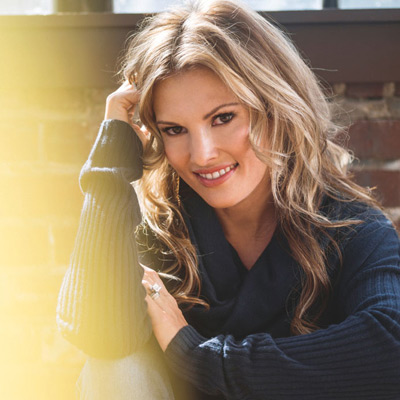Heidi Hamels Is More Than Just Mrs. Cole Hamels
Heidi Hamels will hate the way this story begins.
But this is where her story must begin, because without it, the farm girl never becomes a celebrity, which is how she meets a handsome young man with a wicked changeup who asks her to marry him, and that handsome man doesn’t win a World Series, or tell his wife that her passion is his passion and yes, to take briefcases full of his money and create a foundation that will, without exaggeration, save the lives of children in a far-away country he’s never stepped foot in, and to adopt an orphan from another far-away country, and while she’s at it, to give a little hope to the rundown public schools in the city they now call home.
So the story starts here: Heidi Strobel, as she was known then, standing on a wooden perch in the middle of a blackwater river in the Amazon, hungry and exhausted in the way that makes you do strange things, preparing to take her clothes off for Oreo cookies and peanut butter and a soda in front of what would later be a national television audience. To everyone watching—maybe even herself—it seemed as though she’d traded her dignity for a snack and a morsel of fame, without knowing she was actually about to take her first step toward something much bigger. Naked and unafraid, Heidi jumped.
Heidi Hamels would prefer to begin just about anywhere else, like the first time we meet. Though she usually avoids the word “celebrity,” that’s what she is, and has been, to varying degrees, since her appearance on season six of CBS’s Survivor 10 years ago. We are introduced at XIX, the restaurant high atop the Bellevue with stunning views of the skyline, where Heidi has just been honored as one of the city’s most fashionable women by Nicole Miller Philadelphia. The 35-year-old looks the part—perfectly put-together in a silvery-gray dress that shows off her toned figure, kleig-light smile, blond hair extensions spiraling across her slim shoulders. When Heidi stands up from her table to greet me, she shimmers. “Would you like some food?” she offers, before ordering steak frites and a glass of cabernet. “Do you mind if I eat while we talk?”
By her side is G-N Kang, the director of operations for the Philadelphia office of the Hamels Foundation, the nonprofit Heidi and her husband, 29-year-old Phillies pitcher Cole Hamels, launched in 2008. G-N opens her chrome-shelled MacBook and scrolls through photos from the foundation’s latest trip to Malawi, in September. The African nation holds a number of unwanted distinctions, including more than half a million children orphaned by AIDS and the title of eighth poorest country in the world. I know these things because Heidi tells them to me in a breathless burst, like a five-year-old who just can’t wait to tell you a story! Her passion project is a $3.5 million primary school her foundation is building in the village of Namunda, where young girls are more likely to become prostitutes than high-school graduates. Many Malawian children are raised by their grandparents, because their parents are dead. Every graduate of a Hamels Foundation school will have seven skill sets that will hopefully translate into jobs someday. G-N finally speaks, explaining that the act of fetching water there requires a five-mile walk, then five more back home. “Great point, G-N,” Heidi says. “Such a great point. Glad you brought that up.”
Some people would describe Heidi as a “force of nature.” Others might call her simply annoying—so unrelenting with all the Africa stuff. Okay, yes, we get it, you’re saving the world. But consider that Forbes recently named the Hamels Foundation “an athlete charity that actually works,” because 100 percent of the money it raises is invested in Africa and the places Heidi and Cole have called home—San Diego and Philadelphia and Springfield, Missouri. Of all the athletes and their wives in this town, only two other couples—Chase and Jen Utley and Jimmy and Johari Rollins—have achieved such name-recognition status. They also run their own worthwhile charities. But the Hamelses have both local and global goals, and live like they preach—last fall, they adopted an orphaned baby girl from Ethiopia. Their annual “Diamonds and Denim” fete has become one of the city’s must-attend social events. Heidi and Cole are the closest thing Philadelphia has to Brangelina. As Heidi later tells me, “I hate to even use another celebrity in an interview, because you don’t want to take their idea as your own, but Angelina Jolie one time said, ‘I hope nobody remembers me as an actress. I hope everybody remembers me as a U.N. ambassador.’”
Yes, she says “another celebrity,” as if she and Angie are in the same club. Perhaps you find that distasteful or laughable—or honest, because it’s true, to a degree. Heidi doesn’t really care what you think of her, as long as the foundation’s mission—her mission—is understood. Somewhere in the middle of her Malawi filibuster at XIX, Heidi shares two anecdotes that help tell her story, to explain how she went from reality-TV star to international do-gooder. We’ll save one tale for later. The other happened after she’d finished Survivor, when she asked the show’s host, Jeff Probst, why she’d been selected to compete.
“He said they picked me because I was strong and tough,” she says, “but that the GP—that’s the general public—wouldn’t believe a pretty blonde could be smart. That’s when I knew I was in trouble.”



